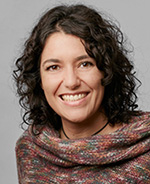Dr. Berta Martín-López
“Biodiversity conservation can be achieved if we previously respect those human value- and knowledge-systems that genuinely connect with the biosphere”.
 Foto bereitgestellt von
Foto bereitgestellt von
Dr. Berta Martín-López
Angaben zur Person:
Berta Martín-López, PhD, Sustainability Science
Institutionelle Anbindung:
Leuphana University of Lüneburg, Faculty of Sustainability, Institute of Ethics and Transdisciplinary Sustainability Research
Weitere Hintergrundinformationen zu Person und Institution:
https://www.researchgate.net/profile/Berta_Martin-Lopez
http://www.leuphana.de/universitaet/personen/berta-martin-lopez.html
Autor in welcher Expertengruppe / Task Force (vergangen und gegenwärtig); ggf. weitere Funktionen im IPBES-Prozess:
- Coordinator Lead Author of Chapter 2 of the Deliverable 2(b) Regional Assessment on biodiversity and ecosystem services for Europe and Central Asia
- Review Editor of Chapter 5 ‘Biocultural diversity, pollinators and their socio-cultural values’ of Deliverable 3(a): Thematic assessment of pollinators, pollination and food production
Teilnahme bei anderen IPBES-relevanten Aktivitäten:
Author of the IPBES conceptual framework: Díaz et al. (2015) The IPBES Conceptual Framework - connecting nature and people. Current Opinion in Environmental Sustainability 14: 1-16.
http://www.sciencedirect.com/science/article/pii/S187734351400116X
Fragen:
Was ist Ihre Motivation, sich aktiv am IPBES-Prozess zu beteiligen?
To contribute to ascertain the importance of nature for multiple societal actors by bringing together scientific and indigenous and local knowledge (ILK) as well as multiple value-systems.
Was ist für Sie das Besondere am Weltbiodiversitätsrat IPBES?
To me the most innovative and relevant (while challenging) aspects of IPBES is the integration of indigenous and local knowledge (ILK) and scientific knowledge into the assessment. Considering different sources of knowledge allows us to give voice to multiple social actors and to acknowledge the deep and throughout existing knowledge of local communities about human-nature interactions.
Für welches Kapitel haben Sie sich zur Verfügung gestellt und was wäre ein wertvolles Resultat aus Ihrer Sicht?
In the regional assessment for Europe and Central Asia, I am responsible of the coordination of the whole chapter and also of conducting the assessment of particular cultural ecosystem services (or non-material nature’s contributions to people). In the whole chapter, we are dealing with different methods to perform the assessment of nature’s contributions to people and quality of life, in particular we are conducting literature review, indicators-based and ILK-based assessments. This comprehensive approach will contribute to determine the existing level of evidence and agreement regarding the status and trends of nature’s contributions to people (NCPs) on the basis of different knowledge sources. A second relevant result that I envision is to provide relevant information about the impact of current management of nature and NCPs on social equity and environmental justice.
Welche Erfahrungen haben Sie bereits mit „Wissenschafts-Politik-Schnittstellen“ gemacht?
In IPBES, the experience I am facing is to translate the knowledge we are building into policy relevant messages. Former to IPBES, I have been involved in a EU-FP7 project that aimed to operationalize the concept of ecosystem services into land, water and urban management and decision-making.
Welche Chancen und Herausforderungen sehen Sie bei einer Mitarbeit an solchen Schnittstellen?
The challenges I am experiencing are related with the need of reach agreement among scholars representing different disciplines and methodological approaches, as well as cultures, world views and knowledge-systems. The experiment that IPBES entails in terms of inclusiveness will give us several guidelines for fostering transdisciplinary science if a reflection about the process itself is properly developed.
Was wäre Ihr persönlicher Wunsch für die Zukunft von IPBES?
I wish that IPBES contribute to raise awareness about the importance of respect and include ILK, integrate multiple values of nature hold by different social groups, and the consequences of nature management in equity and justice. I personally wish to contribute to support more equitable and fair management options.




